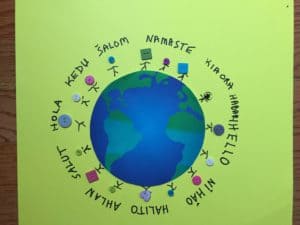Learning Languages: It’s A Small World After All
Some years ago, when my three children were in various stages of elementary school, my sister and I decided to pack our up our broods for a fun-in-the-sun vacation in Cabo San Lucas, Mexico. But before we could head to the white sand beaches, we had to pass through security.
Now, the inspection was really quite perfunctory. But it was in Spanish. I greeted the customs agent with an “Hola” and a smile and then strained to understand the question he asked in response. As I stumbled through a “Lo siento” with a totally confused expression on my face, and he repeated himself in a slower version of the same Spanish (which I still did not understand), my eldest daughter jumped in and answered in perfect Spanish. The agent smiled and nodded and we were on our way to the beach. Yessss! Score one for bilingual education.
I should mention that I do speak broken French and, though I am not fluent, I do make a go at it when in France. So many Americans complain about the snobbishness of the French people. Not me. They may look at me with a cocked head and an amused smile but most of all I have found an almost universal appreciation for my attempts at Francais.
So that’s part of it. Better vacations. But there are a lot of other – arguably more important – reasons to learn more than one language.
Bilingualism Gives You A Leg Up in the Global Economy
“It’s the economy, stupid.” We have lots of pressing issues to think about but this one sucker-punches us over and over again. Unemployment, stock market woes, the housing crisis. You name it. And, nowadays, it’s not just about what’s going on here at home. We are part of a “global economy.” What happens in Greece affects all of Europe which, in turn, affects the U.S. Foreign-owned companies provide jobs here and American-owned businesses have offices around the world. Many of my friends travel overseas for work without thinking twice – it’s just part of the job. And – as reported in US News and World Report – those who speak another language have a greater chance of succeeding in business.
It wasn’t always this way. I remember once watching my father take off from O’Hare Airport for a business meeting in New York. The whole family was there for the sendoff, my sisters and I pressing our faces against the windows in the terminal, awed that Papa had such important business that he had to fly on an airplane to NEW YORK. Flash forward a few decades and I’m struck by a TV commercial of a little girl and her father sending videos to one another as he conducts business overseas.
Projections are, the trend toward international business is only going to get bigger. Our kids will probably live in an even more fluid world where doing business in Beijing or Mumbai or Sao Paolo is par for the course. With that, knowing a second (or third or fourth) language may be a make-or-break skill.
Bilingualism Makes you Smarter
So, what else? Well, it looks like knowing multiple languages makes you smarter. There is research out there that links bilingualism to better memory, more effective multi-tasking and (looking down the road) better resistance to dementia giving us a better shot at actually having happy golden years. Have I got your attention? ☺
Bilingualism Builds Friendships
And then there are friendships. Some of the parties I went to in college looked like the United Nations – students with ancestry from China, Japan, Russia, Ghana, Mexico, Italy, and on and on. We built a language bank around the word “Hello” in every language we could think of. And we had a blast exchanging greetings. We felt pride in sharing our backgrounds of origin and exhilaration in the new bond with one another through our shared language.
When and How?
You may have heard – learn a language young or else…. A version of “use it or lose it.” But there are studies that conclude it is never too late to learn. So, if your children’s elementary school starts them off young – great! And, more and more schools are teaching a foreign language in elementary grades. But even if this is not the case at your school, you can jumpstart your kids to love learning languages – and they can become fluent later. When my kids were little, the kitchen was a tangle of tags I pasted onto fridge, stove, sink, and cupboards, identifying Spanish names for these objects. Though I wasn’t fluent, we had many great times sprinkling these words into our discussions. I think those good feelings are part of why my kids continued in their Spanish studies.
I’ll end with this. An old-time philosopher said: “The limits of my language mean the limits of my world.”
Do you have stories about the power of languages in your life?

Leave a Reply
Want to join the discussion?Feel free to contribute!